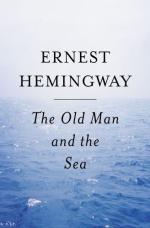|
This section contains 893 words (approx. 3 pages at 300 words per page) |

|
The Iceburg Principle in the Old Man and the Sea by Ernest Hemingway
Summary: The Old Man and the Sea written by Ernest Hemingway uses the iceburg principle to enhance the content of the book. One of the main characters, the marlin, is an example of how Ernest Hemingway uses the iceberg principle to enhance his writing.
While Hemingway talked about the boy he used the iceberg principle, to make his writing interesting, and creative. First, Santiago and the boy had a conversation in Santiago's shack, "what do you have to eat"' the boy asked. `A pot of yellow rice with fish. Do you want some"' `No. I will eat at home..." (16). The boy and Santiago understand each other. The author does not clearly state why Santiago and the boy have the conversation of things not there everyday but the reader can take it any way they like making the story more enjoyable to read. Next, when on the sea Santiago was lonesome and talked to himself. "I wish the boy were here and that I had some salt" (56). Santiago said many times how he wanted the boy to be with him, and how he wished the boy were there. The boy being...
|
This section contains 893 words (approx. 3 pages at 300 words per page) |

|


